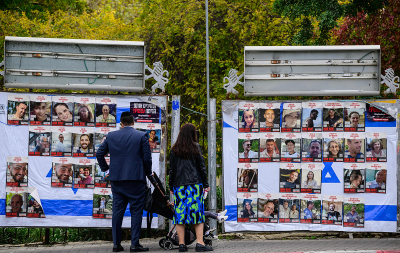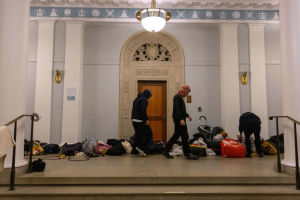What I saw in Israel

Like many Americans, I watched in horror as the peaceful calm of a Shabbat morning was shattered by Hamas terrorists on October 7th. Having visited Israel twice before, I read and watched the events unfold with heightened interest, yet I was a distant bystander, unable to offer direct, tangible help to the victims.
That changed last week when I traveled to Israel with a group of American Christians just 100 days after the attacks. Our mission was to aid two of the villages impacted, Netiv HaAsara and Kfar Aza. As I engaged with the survivors and walked amongst the ruins, I stepped into the shadow of a haunting past as evil incarnate once again visited the Jewish people.
Comprehending the complexity of this conflict is a daunting task for an outsider. Candidly, my initial assumption was that the attacks on the border villages were partly due to their proximity to Gaza, viewed by Palestinians as pseudo-settlements that agitated fears of Zionism. Nothing could be further from the truth.
The Israelis living closest to the Gaza border are, in fact, overwhelmingly committed to peace and a two-state solution. They actively strive for better relations with the Palestinian people. I encountered individuals who regularly facilitated medical care in Israel for Palestinians and learned that the kibbutzim along the border often employ Palestinians, among the 140,000 who enter Israel daily on work permits.
One story was that of Shmuel from Netiv HaAsara. He had formed a fruitful business partnership with a man from Gaza, which abruptly ended when his partner stopped responding to calls and texts on the Wednesday prior to the attacks. Shmuel described his horror and shock to learn that this man was actually a "judge" within Hamas, responsible for enforcing Sharia law in Gaza, including carrying out executions.
When the terrorists attacked these villages, they knew not only the exact location of the armories but also the homes of the leaders of each village and those of the security teams and first responders. They gathered this intelligence deliberately and deceptively for years before the attacks, betraying the goodwill of the Israelis who were literally living out the promise of a two-state solution.
The bitter irony of October 7th is that those most committed to peace were the targets. This has triggered a fundamental shift in the Israeli psyche, bringing about an unprecedented level of unity on this matter. The international community simply does not fully grasp this new reality.
In light of this, what does an end to hostilities look like? Is it a hostage exchange for a cease-fire, like the one that existed on October 6th? A renewed occupation of Gaza, which Israel unilaterally left in 2005? Or perhaps a grand compromise involving the surrounding nations that would finally lead to the elusive two-state solution?
Speaking with everyday Israelis, survivors, soldiers, and government leaders made one thing clear: Israel will not tolerate an outcome that allows Hamas to remain in power. This is not simply a political statement, it is a moral imperative. There is now little debate or question as to the nature of the enemy and Israel’s moral duty to eradicate Hamas.
But what could possibly constitute the defeat of Hamas, which has a firm grip over the Palestinian people? With around 10,000 of their estimated 40,000 fighters killed, simply increasing this body count won’t lead to peace for Israel because Hamas will still be able to claim victory.
Even if Hamas loses nearly all of its fighting forces but retains control over the Gaza Strip, it will have achieved what no other Arab power has managed in the last 75 years: launching an attack on Israel without losing its territorial holdings. In the context of the Holy Land, land is the ultimate measure of power and success.
A regime can withstand severe economic and political turmoil, with its military forces depleted and its population suffering, but as long as it maintains control over its land, a regime can and will survive. For Hamas and its allies, true ideological defeat is inextricably linked to some form of territorial loss.
The international community will see the end of Israel's military campaign when they have achieved a notable reduction and intensification of control over the Gaza Envelope, likely evidenced by the establishment of an expanded security buffer.
This outcome serves as both the only practical response by Israel and the only one that will signal clear defeat for Hamas in the eyes of its supporters and allies. Only then will there be an opening for lasting political and ideological change within Gaza.
Will Davis is an entrepreneur living in Austin, TX. He traveled to Israel with Passages Israel, a Christian non-profit.




























